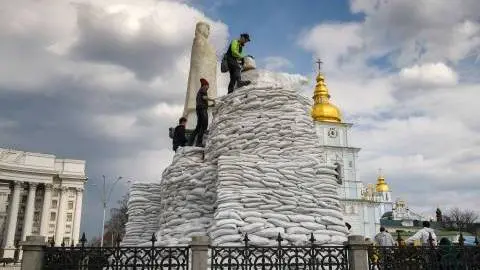Euro focus: No more economic trophies for Germany; stagflation beckons
The year started with the prospects of Europe becoming a growth champion. However, the war in Ukraine has postponed a strong economic rebound once again and the German economy looks likely to be one of Europe's growth laggards this year
At the start of the year, we were extremely optimistic about the growth prospects of the German economy. Richly filled order books, low unemployment and announced fiscal stimulus combined with the anticipated end of global supply chain frictions and the lifting of pandemic restrictions were all the ingredients needed for stellar growth in the eurozone’s largest economy. The war in Ukraine has not only dramatically changed the world but also the outlook for the German economy.
Higher energy and commodity prices than at the start of the year and probably for a long while, new supply chain disruptions on top of the old ones with a high risk that these will be disrupted for good, and elevated uncertainty and fear will weigh on both supply and demand in the coming months. Real disposable incomes of households will suffer and companies will have increasing difficulties dealing with the costs of higher energy and commodity prices, putting corporate profit margins under pressure.
Downward revision of our GDP growth forecast
The risk of another contraction in the first and second quarter of the year and hence a technical recession is high. And it's all down to higher energy and commodity prices, new tensions in the well-known supply chain frictions of the last couple of years as China reintroduced lockdowns, and also completely new supply chain problems.
For the entire year, we have revised downwards our growth forecast to 1.4%, which would delay the return of the economy to pre-pandemic levels until the end of this year. Remember that the eurozone economy had already returned to pre-pandemic levels at the end of 2021. As for inflation, we expect the annual rate to average more than 8% this year, with a high likelihood that monthly inflation rates could even enter double-digit territory.
Entire economic model needs a rapid change
Even worse, the risk is high that the economic implications of the war are much more of a structural game-changer for the European and particularly the German economy than the pandemic has ever been. With high energy and commodity prices for a protracted period, possibly even energy supply interruptions, an acceleration of deglobalisation, a possible new cold war, an export-oriented economy highly dependent on energy, then of course imports will suffer. Government support schemes will dampen the adverse impact of the war but will not be able to avoid stagflation.
The only silver lining for the German economy in our base case scenario is that the squeeze on the economy and the entire economic model will accelerate the green transition. Energy independence and continued investments into digitalisation and education could help even more, requiring fiscal stimulus and private investment. Eventually, the pressing and urgent need to dramatically change the economy’s business model could be the long-awaited boost to structural international competitiveness. However, judging from where we stand today, things will first get worse before they get better.
Download
Download article
31 March 2022
ING Monthly: There’s nothing normal about the global economy This bundle contains {bundle_entries}{/bundle_entries} articlesThis publication has been prepared by ING solely for information purposes irrespective of a particular user's means, financial situation or investment objectives. The information does not constitute investment recommendation, and nor is it investment, legal or tax advice or an offer or solicitation to purchase or sell any financial instrument. Read more
